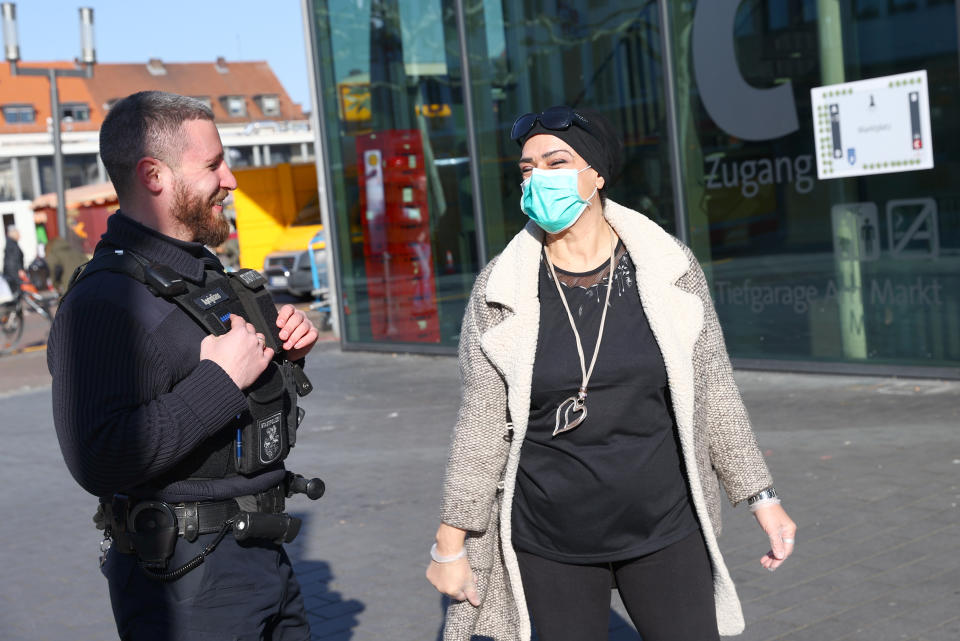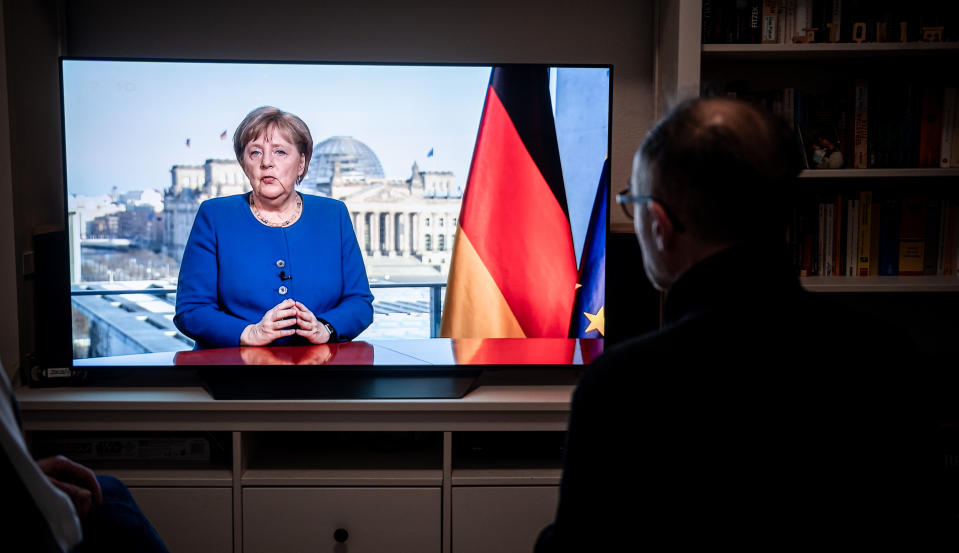Europe's largest economy Germany extends coronavirus lockdown until May 3

Chancellor Angela Merkel announced on Wednesday that Germany would extend its current lockdown for another two-and-a-half weeks, until 3 May.
“What we have achieved is a fragile interims success,” said Merkel at a press conference after her video-meeting with the heads of Germany’s 16 states about how to start easing the lockdown on public spaces, businesses, and schools, which has been in place since 22 March.
The current level of social distancing, for example, maintaining a 1.5 metres distance from others when outside, and only meeting in groups of maximum two (or with family members) in public will be the rule until at least 3 May. Merkel said that wearing face masks in public is “urgently recommended.”
Most small shops, up to a size of 800 square metres, will be able to open again from next week.
Primary schools and the final years of secondary schools will be able to start again gradually from Monday 4 May. Kindergartens will stay closed until further notice.
Large-scale events will be banned until the end of August, and religious gatherings will continue be prohibited for the moment.
READ MORE: Angela Merkel’s final act is her biggest challenge so far
Berlin’s strategy on how to open up the country again — and especially its steps to restart Europe’s largest economy — will be closely watched by other governments, as Germany’s handling of the coronavirus pandemic and Merkel’s strong crisis-leadership has been widely lauded as exemplary.
In a national TV address in March, Merkel called the pandemic the biggest challenge since the Second World War. “It is serious. Take it seriously,” she told Germany.
Germany has the fourth-highest number of confirmed coronavirus cases globally. However, thanks in large part to its speed and preparedness in terms of mass testing and early isolation of the sick, as well as its high number of intensive care beds, it has managed to avoid the high death tolls suffered by Italy, Spain, France, and the UK.
In total, almost 3,500 people have died from the virus in Germany, a fatality rate of around 2.6%. Italy’s COVID-19 mortality rate is currently at just over 12% and Spain at a tick over 10%. It should be noted, however, that the early cases of COVID-19 in Germany were mainly among fitter, younger people, who were able to recover.
Lockdown exit strategies

Some EU states have already announced different dates for loosening of social and business restrictions.
France’s tough lockdown will stay in place for another month, until at least 11 May, while Denmark is already opening kindergartens and primary schools in support of working parents.
Spain is allowing some sectors, including those in construction, to return to work this week and Italy is opening some shops again. The UK government is expected to announce on Thursday this week how much longer its shutdown on public life will go on — it could be up to another month.
European Commission president Ursula von der Leyen today urged EU member states to collaborate on their plans to begin loosening coronavirus restrictions. However, in her “roadmap” document on the topic, she notes that there is no one-size-fits-all approach.
Von der Leyen recommends that states reopen their borders in a systematic way when the time is right. Germany said today that it will maintain closed borders with all its neighbours except Belgium and the Netherlands until 4 May.
The number of new coronavirus cases in Germany fell for a sixth day in a row on Wednesday. Johns Hopkins University data showed 2,138 new cases as of early Wednesday morning, and a total of 132,210 cases overall.
While deaths from rose by 300 on Wednesday from Tuesday, the infection rate (how many people are infected by one single person with coronavirus) had dropped to one— getting down to 1:1 or lower is one of the key goals in combatting the virus, according to the Robert Koch Institute.
READ MORE: Carmakers slowly reboot plants in Europe after COVID-19 shutdown

 Yahoo Finance
Yahoo Finance 